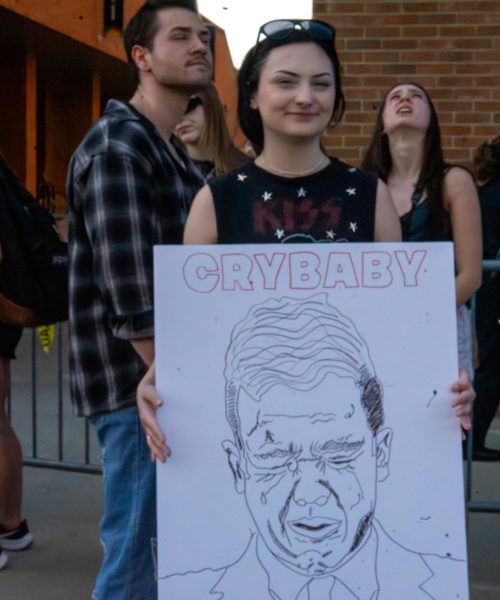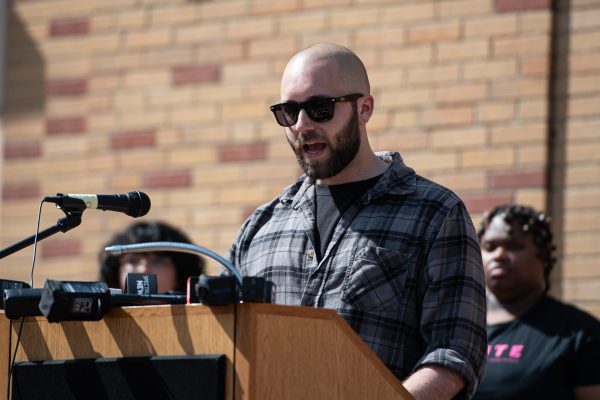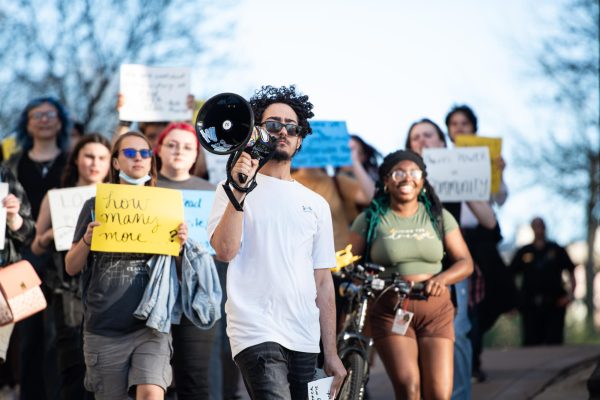‘Hippie’ seeks Army leadership
November 8, 2005
Junior anthropology major Lyndsey Williams plans to work in military i intelligence and study paleontology. She is currently a cadet in the Army ROTC.
Credit: Jason Hall
The advantages of becoming an Army officer outweighed the disadvantages for junior anthropology major Lyndsey Williams.
In her sophomore year, Williams said she decided she needed to improve her leadership skills, which she felt were important in her field of study. Williams was told by her roommate, who was in the Air Force ROTC, that ROTC is a good way to get those skills.
At first Williams said she was unsure about joining the ROTC.
“Why would I join the military?” Williams said. “It made no sense because I was a liberal, crazy girl who was a hippie three-fourths of the time and had been to protests.”
But after careful consideration, Williams said she decided to take the basic courses in the Army ROTC, so she could get the leadership skills she was after.
To become an officer in the Army, cadets are required to take one Army ROTC course per semester. The first two years of courses are called basic courses. There is no commitment to the Army while taking the basic courses.
The second two years are called the advanced courses, and cadets are required to sign a four-year-service contract with the Army before they are allowed to take them.
“I didn’t plan on giving four years of my life to the Army,” Williams said. “I planned on spending two years in the ROTC, never signing my contracts and dropping out when I was done. All it was going to be was two years of classes where I could learn something that was useful later on in life.”
Williams said her plans changed soon after she joined the Army ROTC.
“As soon as I started ROTC, I knew it was someplace I would be happy,” Williams said. “I knew I would do well because I am extremely organized, and the military requires organization. I figured I can do this. This would probably work well with my personality.”
Because Williams missed the first year of ROTC courses, she was told she would have to go to the Leaders Training Course over the summer to make up for the missed classes.
“We have to have them in class for two years before the advanced courses,” said Maj. Joe Paydock, Army ROTC admissions officer. “They have to make up for the first one or two years they missed, and the way we do that is through the Leaders Training Course.”
Paydock said the course, which is held in Fort Knox, Ky., is 28 days of training. Cadets do adventure activities like obstacle courses, confidence courses, paintballing, water operations, basic army tactics and repelling.
“It’s adventurous as well as a great learning environment,” Paydock said. “Not only are you getting a lot of experience, but you are learning a lot about yourself and leadership in the process. What is great about it is you are completely engulfed in military stuff for 28 days. Everyone is there evaluating if this is something they want to do.”
Williams said the course was one of the hardest things she has ever done.
“I experienced a lot of things I’ve never experienced before,” Williams said. “They had us doing ropes courses that I never imagined myself doing. I climbed a 40- foot tower blindfolded. There were obstacles in the way, and I had to feel my way through it. By the time you get on your plane to go home, you almost feel like you are king of the world. You think, if I can do this, I can do anything.”
Williams said completing the course was especially difficult for her because she was one of the smallest cadets participating.
“The physical aspect was definitely the hardest,” Williams said. ” I weigh 105 pounds. At LTC the bag that I carried around on my back weighed about 45 pounds. For a guy who weighs 200 pounds that’s no big deal, but 45 pounds is about half my body weight. Although, when it was all said and done my size only made me work harder.”
After completing the course, Williams signed a four-year contract with the Army and was awarded a scholarship to pay for her final two years of school.
Williams said she is looking forward to her four years as an officer in the Army because it will give her time to think about her future.
“I didn’t know what I wanted to do with the rest of my life,” Williams said. “In the Army they take care of the next four years, and I can figure out what I want to do.”
Contact ROTC reporter Katherine Colucy at [email protected].























